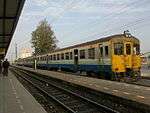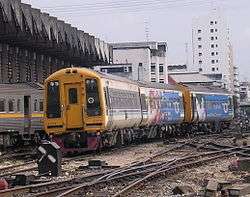Greater Bangkok Commuter rail
|
Commuter rail at Hua Lamphong Railway Station | |
| Overview | |
|---|---|
| Owner | State Railway of Thailand |
| Locale | Bangkok Metropolitan Region and adjacent provinces |
| Transit type | Commuter rail |
| Number of lines |
5
|
| Operation | |
| Operator(s) | State Railway of Thailand |
| Technical | |
| System length | 623 km (387 mi) |
| Track gauge | 1,000 mm (3 ft 3 3⁄8 in) |
| Electrification |
None use diesel locomotive or diesel multiple unit |
Greater Bangkok Commuter rail is a commuter rail system in Bangkok Metropolitan Region, Phra Nakhon Si Ayutthaya Province, Saraburi Province, Lopburi Province, Suphan Buri Province, Ratchaburi Province, Chacheongsao Province, Nakhon Nayok Province, Prachinburi Province, and Samut Songkhram Province. It runs from and to the outskirts of the city during the rush hour, and passenger numbers have high. It is operated by State Railway of Thailand (SRT) that also operates inter-city rail. Commuter rail services always have number 3xx. Most of the system are double track.
Current lines
| Line | Connection(s) | Length | Terminus | Gauge |
|---|---|---|---|---|
| Lopburi Line | SRT Northern Line SRT Dark Red Line |
133 km (83 mi) | Hua Lamphong - Lop Buri | 1,000 mm (3 ft 3 3⁄8 in) |
| Kaeng Khoi Line | SRT Northeastern Line SRT Dark Red Line |
125 km (78 mi) | Hua Lamphong - Kaeng Khoi | |
| Prachinburi Line | SRT Eastern Line Airport Rail Link SRT Light Red Line |
122 km (76 mi) | Hua Lamphong - Prachin Buri | |
| Ratchaburi Line | SRT Southern Line SRT Light Red Line |
101 km (63 mi) | Thon Buri - Ratchaburi | |
| Suphanburi Line | SRT Southern Line SRT Light Red Line |
142 km (88 mi) | Hua Lamphong - Suphanburi |
Rolling stock
Current
| Type | Manufacturer | Numbers | Year built | Quantity built | Power (horsepower) | Max Speed (km/h) | Image | Line(s) |
|---|---|---|---|---|---|---|---|---|
| THN | Tokyu, Hitachi and Nippon Sharyo | 1101–1140 | 1983 | 40 | 235 | 105 | |
Lopburi Line (Train no. 303, 304, 305, 306, 311, 317, 318) Kaeng Khoi Line (Train no. 339, 340) Prachinburi Line (some trains) Suphanburi Line (Train no. 355, 356) |
| NKF | Nippon Sharyo, Hitachi, Fuji Heavy Industries,Kawasaki Heavy Industries, Niigata Tekkousho, and Kinki Sharyo | 1201–1264, (center) 2101-2112 | 1985 | 64+12 | 235 | 105 | .jpg) |
Lopburi Line (Train no. 303, 304, 305, 306, 311, 317, 318) Kaeng Khoi Line (Train no. 339, 340) Prachinburi Line (some trains) Suphanburi Line (Train no. 355, 356) |
Former
| Type | Manufacturer | Numbers | Year built | Quantity built | Power (horsepower) | Max Speed (km/h) | Image | Note |
|---|---|---|---|---|---|---|---|---|
| RHN | Hitachi | 1011-1048 (power cars) 11-48 (trailer cars) |
1967 | 38+38 | 220 | 90 |  |
Now use as a Northeastern Line regional rail. |
| ASR | BREL, Derby Works | 2501–2512, (center) 2113-2120 | 1991 | 12+8 | 285 | 120 |  |
Now use as inter-city rail trains. |
Maeklong Railway

The Maeklong Railway (also known as the Mae Klong Railway) is a 1,000 mm (3 ft 3 3⁄8 in) (Metre gauge) railway that runs for nearly 67 kilometres (42 mi)[1] between Wongwian Yai, Bangkok, and Samut Songkhram in Central Thailand. The line consist of two sections: the eastern Mahachai Line, which runs between Samut Sakhon and Wongwian Yai with 18 stations; and the Ban Laem Line, which runs between Samut Sakhon and Samut Songkhram with 15 stations. The two stretches are separated by the Tha Chin River at Samut Sakhon. The only way to connect between the stations on the opposite sides of the river is by boat.[2]
Red Lines Commuter rail
The Red Line Mass Transit System Project is a planned commuter rail system to serve the Bangkok Metropolitan Region. Part of the Mass Rapid Transit Master Plan in Bangkok Metropolitan Region, it will consist of two lines, one (also referred to as the Dark Red Line) running from Thammasat University's Rangsit campus to Maha Chai in Samut Sakhon Province, and the other (Light Red Line) running from Sala Ya in Nakhon Pathom Province to Hua Mak in Bangkok, with both passing through Bang Sue which will act as a connecting hub to the MRT system. As of 2012, the Bang Sue – Taling Chan segment of the Light Red Line is under construction, and the Bang Sue – Rangsit segment of the Dark Red Line is being prepared for construction bidding. Most of the railway will run alongside existing national railway tracks, eventually replacing them. Segments running through inner-city areas will be elevated, and the system will be electrified by overhead lines. The system is to be owned and is being developed by the State Railway of Thailand.[3][4] Since the Red Lines run roughly along the alignment of the failed Hopewell Project, they have been described as a "Hopewell revival".[5]
See also
- Mass Rapid Transit Master Plan in Bangkok Metropolitan Region
- List of urban rail systems in Thailand
- MRT (Bangkok)
- BTS Skytrain
- Airport Rail Link (Bangkok)
- SRT Red Lines
References
- ↑ Nielsen, Flemming. "The Tachin Railway". ScandAsia. Retrieved 12 March 2013.
- ↑ Pass, Mike. "Thai Steam Today & Yesteryear" (PDF). 2Bangkok. Retrieved 12 March 2013.
- ↑ "แผนแม่บทระบบขนส่งมวลชนทางรางในเขตกรุงเทพฯและปริมณฑล พ.ศ.2553-2572 (Mass Rapid Transit Master Plan in Bangkok Metropolitan Region)" (PDF) (in Thai). Office of Transport and Traffic Policy and Planning. Retrieved 16 January 2012.
- ↑ "โครงการระบบรถไฟชานเมือง (สายสีแดง) Commuter rail system project (Red Line)". SRT website (in Thai). State Railway of Thailand. Retrieved 20 January 2012.
- ↑ "Reviving the former Hopewell route", translated and summarized by Wisarut Bholsithi from Prachachart Thurakij, March 4–7, 2004. "This Northern Commuter has to connect with the Airport Link which is not even at the design stage. At the minimum, the detailed design for the Airport Link must be done by July 2004. The Hopewell revival will be an elevated single floor--either shared tracks or separated tracks for High Speed Rail, DMU/Diesel Tracks, and Red Line Commuter which all have to be done in six years. The elevated section will end at Don Muang and then it will be at grade with separated tracks."

